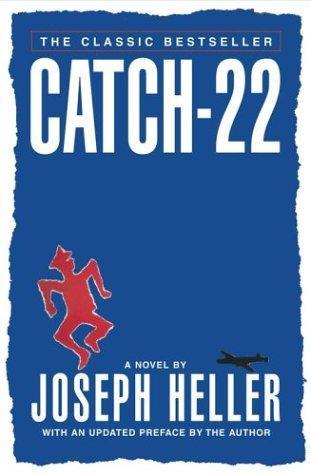Title: Absurdity and Anguish in War: "Catch-22" by Joseph Heller
Joseph Heller's "Catch-22" is a darkly comedic and satirical masterpiece that offers a scathing critique of the absurdity and bureaucracy of war. Published in 1961, this anti-war novel has become a landmark work of American literature, challenging traditional narrative structures and introducing the eponymous term into the cultural lexicon.
Set during World War II, the novel follows Captain John Yossarian, a U.S. Army Air Forces B-25 bombardier, as he navigates the illogical and surreal world of war. The titular "Catch-22" is a paradoxical regulation that exemplifies the absurdity of military bureaucracy: a pilot can be grounded if he is considered insane for flying dangerous combat missions, but requesting to be grounded for one's safety is considered a rational decision, thus making the pilot sane and ineligible to be grounded.
Heller's narrative style is chaotic and fragmented, mirroring the disorienting experience of war. The novel employs a non-linear structure, with events unfolding in a fragmented and circular fashion. The repetition of phrases and events contributes to the sense of absurdity and highlights the futility of the characters' predicaments.
The characters in "Catch-22" are a motley crew of soldiers, each grappling with the lunacy of war in their own way. Yossarian, the protagonist, emerges as an antihero caught in a web of Catch-22s and bureaucratic absurdities. The ensemble cast, including the eccentric Milo Minderbinder and the delusional Doc Daneeka, adds depth to the novel, each character serving as a caricature of the various facets of war and its impact on the human psyche.
Heller's use of dark humor and satire is razor-sharp. The absurdity of war is laid bare through comedic exaggeration, creating a biting commentary on the dehumanizing effects of bureaucracy and the inherent contradictions of military logic. The humor, however, is a coping mechanism for the characters, a way to grapple with the senseless brutality they witness.
Beneath the surface, "Catch-22" explores profound themes such as the nature of sanity, the morality of war, and the struggle for individual agency in the face of oppressive systems. Yossarian's journey becomes a quest for survival and sanity in a world that defies reason and morality.
The novel's impact extends beyond its original context, resonating with readers across different eras and conflicts. Heller's portrayal of the Catch-22 mentality, where one is trapped in a no-win situation, transcends its wartime setting to become a universal metaphor for the absurdities of life.
In conclusion, "Catch-22" is a tour de force of literature that marries dark humor with biting social commentary. Joseph Heller's innovative narrative techniques and incisive satire make this anti-war novel a timeless classic. Its exploration of the human condition in the face of bureaucracy, absurdity, and the horrors of war continues to resonate, ensuring its place as a seminal work that challenges, provokes, and entertains in equal measure.

Comments
Post a Comment